Ten minutes before his class began, Daniel Kim was nearly asleep at his desk. He yawned, rested his head on the table and closed his eyes. It is no substitute for a proper nap.

But after a restless night of homework and studying, a ten minute power snooze seemed like the best option.
“I was taking short 30-minute naps to keep myself fresh,” said Kim, a Lang senior. “I’m tired during the day and I immediately fall asleep after I get back from class.”
Kim is not alone. An August 2009 study published in the Journal of Adolescent Health states that only 30 percent of students aged 17 to 24 sleep the recommended eight hours a night. That same study found that over 60 percent of those surveyed were classified as poor-quality sleepers altogether, citing trouble falling asleep and sleeping late into the day.
In addition to personal stress, erratic daily routines and stimulant use, electronic devices are also being blamed for disrupting sleep patterns. Light emitted from cell phones, mp3 players and computers are especially detrimental at night, according to the Harvard Health Letter. These devices hinder the secretion of melatonin, a hormone that helps regulate sleep cycles.
“Laptops and cell phones emit lots of light that is stimulating and disrupts the brain’s circadian rhythm,” said Jayne Jordan, Director of Medical Services at The New School. “Any of those things should be avoided right before bedtime in order to create an environment where you can go to sleep.”
Habitual sleep deprivation can also wreak havoc on post-graduation life when students often begin professional careers with schedules not conducive to college’s haphazard sleep culture.
Two weeks after graduating from the Fashion Institute of Technology, Anna Rose Rotondi began her job at a Manhattan public relations firm. She immediately struggled to fit sleep into her schedule.
“I was working everyday from 8 a.m. to 6 p.m., and I found myself feeling tired all the time, and wanting to doze off,” Rotondi said. “I was so used to sleeping around my class schedule, and doing homework in the middle of the night, and suddenly I had this very adult work routine that demanded I do things differently. I had to adapt pretty quickly.”
She started implementing an evening routine that included going to bed at the same time every night, putting away her laptop an hour before sleeping, and trying various natural remedies with calming effects.
While it eventually worked, it took some time for her body to adjust to the rigors of her new schedule.
“It took a few months, but I really wish this was something I’d learned to do in college,” she said.
For students who would like to alleviate their sleep woes now, Jordan recommends a number of strategies: avoiding watching television or using your laptop in bed, setting an alarm in the evening at a consistent time to remind you to wind down, not consuming heavy food late at night, and drinking non-caffeinated herbal teas like Sleepy Time, which have a soothing effect.
“If that’s not working, then we might move on to an antihistamine like Benadryl, which is pretty harmless. Unfortunately, it makes you sleepy the next day too,” Jordan said. “In extreme circumstances, we’ll try a short-term prescription sleep aid like Ambien.”
While Jordan said that many students have come to Student Health Services seeking treatment for sleep problems, there are some students who simply make the choice to defer sleep in order to leave more time for coursework.
Jordan admits that encouraging students to get more sleep often feels like a losing battle.
“I always feel like it’s a little trite to make these recommendations,” she said. “But to the extent that they can, I say just try it for a couple of nights and see how it goes.”
Despite the vast amount of evidence pointing to sleep deprivation as a growing problem with far-reaching consequences, these warnings and suggestions are often dismissed by students who have made a conscious decision to forego sleep.
“I’ve resigned myself to it. Sleep hygiene is not high on my list of priorities,” said said. “Passing is.”







Leave a Reply